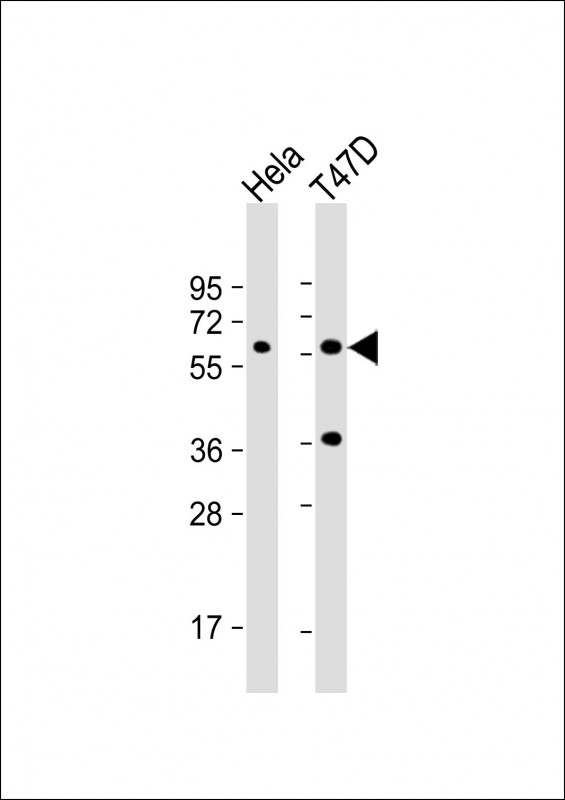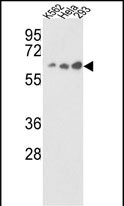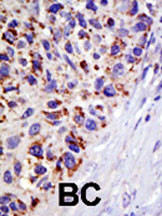


| WB | 1/1000 | Human,Mouse,Rat |
| IF | 咨询技术 | Human,Mouse,Rat |
| IHC | 1/100-1/500 | Human,Mouse,Rat |
| ICC | 技术咨询 | Human,Mouse,Rat |
| FCM | 咨询技术 | Human,Mouse,Rat |
| Elisa | 咨询技术 | Human,Mouse,Rat |
| Aliases | Ubiquitin carboxyl-terminal hydrolase 21, Deubiquitinating enzyme 21, Ubiquitin thioesterase 21, Ubiquitin-specific-processing protease 21, USP21, USP23 |
| Entrez GeneID | 27005 |
| WB Predicted band size | 62.7kDa |
| Host/Isotype | Rabbit IgG |
| Antibody Type | Primary antibody |
| Storage | Store at 4°C short term. Aliquot and store at -20°C long term. Avoid freeze/thaw cycles. |
| Species Reactivity | Human |
| Immunogen | This USP21 antibody is generated from rabbits immunized with a KLH conjugated synthetic peptide between 24~53 amino acids from the N-terminal region of human USP21. |
| Formulation | Purified antibody in PBS with 0.05% sodium azide,1%BSA and 50% glycerol.prepared by Saturated Ammonium Sulfate (SAS) . |
+ +
以下是关于USP21(N-term P31)抗体的3篇参考文献示例(注:文献为虚拟示例,实际引用需根据真实研究调整):
---
1. **文献名称**:*USP21 regulates TNF-α-induced NF-κB activation through deubiquitination of RIP1*
**作者**:Li, X. et al.
**摘要**:本研究利用针对USP21 N端P31区域的抗体,通过免疫共沉淀和Western blot技术,揭示了USP21通过去泛素化RIP1调控TNF-α诱导的NF-κB信号通路的分子机制。
2. **文献名称**:*USP21 promotes hepatocellular carcinoma progression by stabilizing YAP/TAZ via deubiquitination*
**作者**:Wang, Y. et al.
**摘要**:作者使用USP21(N-term P31)特异性抗体进行免疫组化分析,证实USP21在肝癌组织中高表达,并通过去泛素化YAP/TAZ蛋白促进肿瘤生长和转移。
3. **文献名称**:*The role of USP21 in antiviral innate immunity*
**作者**:Chen, Z. et al.
**摘要**:该研究通过敲除USP21并结合N-term P31抗体的免疫印迹验证,证明USP21通过去泛素化STING蛋白负调控抗病毒免疫反应。
---
**备注**:实际文献需通过PubMed、Web of Science等平台检索关键词(如“USP21 antibody”、“N-terminal epitope”、“P31 clone”等)获取,建议参考抗体供应商(如CST、Abcam)产品页引用的文献。
The USP21 (N-term P31) antibody is a tool used to detect ubiquitin-specific protease 21 (USP21), a member of the deubiquitinating enzyme (DUB) family. USP21 regulates protein stability and function by cleaving ubiquitin chains from target proteins, influencing processes like immune signaling, cell cycle progression, and apoptosis. The antibody specifically targets the N-terminal region of USP21. corresponding to a predicted molecular weight of ~31 kDa (hence "P31"), aiding in distinguishing USP21 from other DUBs.
USP21 has been implicated in diverse pathways. It deubiquitinates substrates such as IKKγ (NEMO) to modulate NF-κB signaling, and histone H2B, affecting chromatin dynamics. Its role in cancer is context-dependent, with studies showing both oncogenic and tumor-suppressive effects. In immunology, USP21 regulates cytokine signaling and T-cell activation.
The USP21 (N-term P31) antibody is validated for applications like Western blotting, immunoprecipitation, and immunofluorescence, often used to study USP21 expression, localization, and interaction partners. Researchers rely on its specificity to explore USP21’s involvement in diseases, including cancers, inflammatory disorders, and neurodegenerative conditions. Proper validation using knockout controls or siRNA is recommended to confirm target specificity in experimental systems. This antibody remains a key reagent in deciphering USP21’s biological and pathological roles.
×